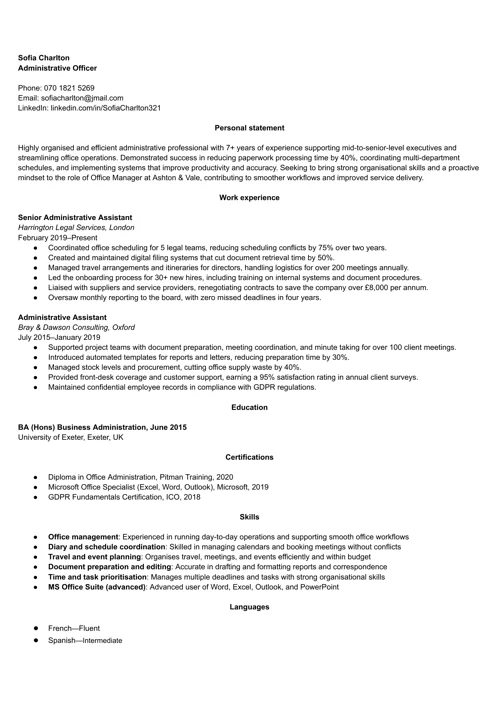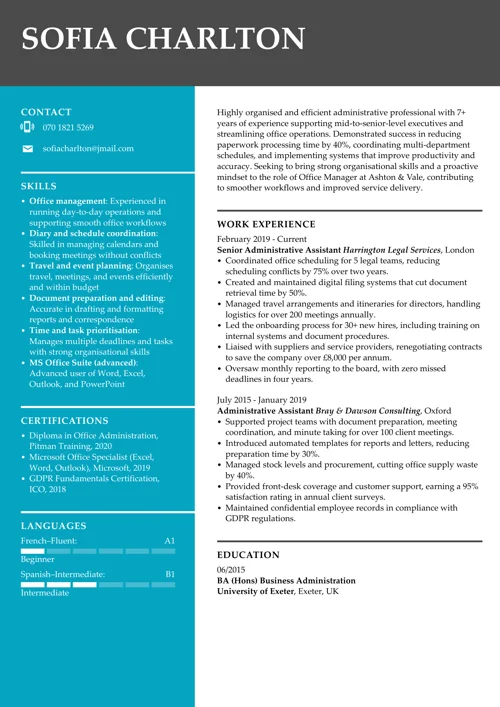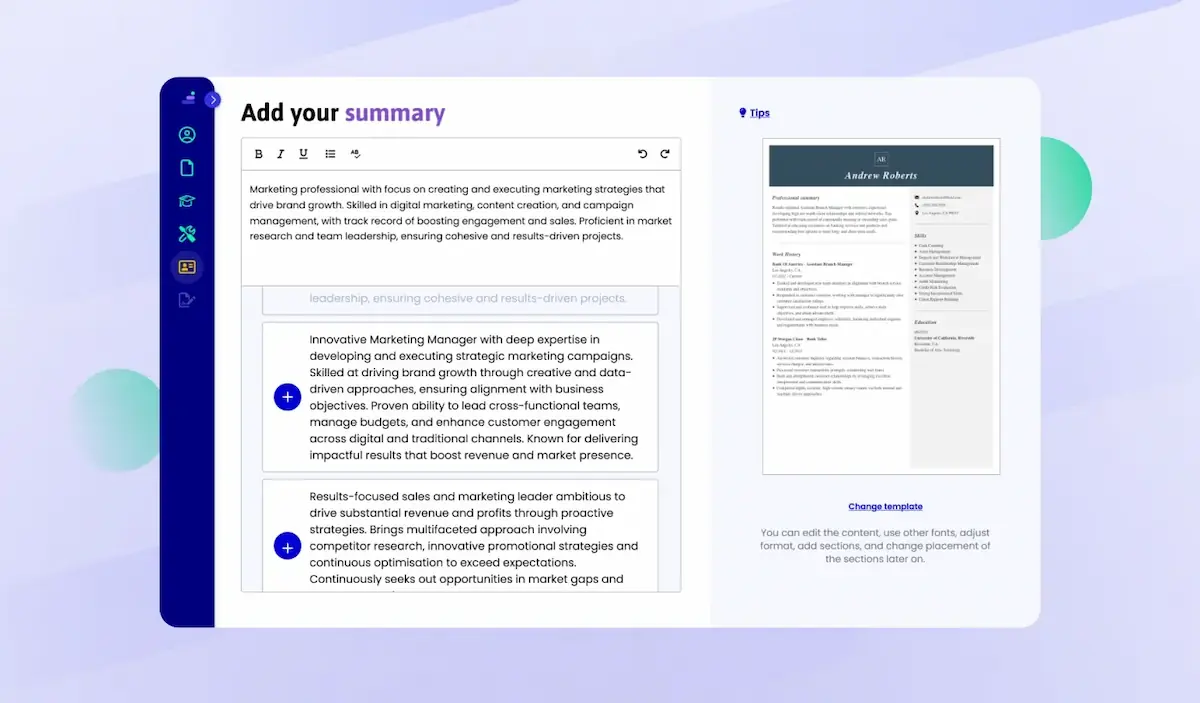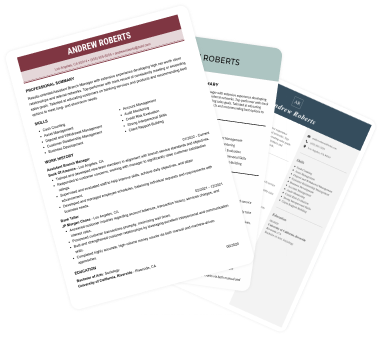Create a professional CV now!
 NO
NO YES
YESLast updated on 29 December, 2025

Our customers have been hired by*:
Trying to break into a new field or advance in your current career? One of the most effective ways to gain insight, build connections, and open doors is through informational interviews. But how do you go about asking for one?
In this article, I’ll show you how to ask for an informational interview and provide a complete list of informational interview questions that can help you gain valuable insights and advice.
Create an effective CV in minutes. Choose a professional CV template and fill in every section of your CV in a flash using ready-made content and expert tips.
Create a professional CV now!
 NO
NO YES
YESWe created the sample on the left using our builder. See other good CV examples like this one.
Need more career tips? Check out these guides:
An informational interview is a meeting where you speak with a professional working in a field or role that interests you to learn about their experience and career path. Unlike a typical job interview, you’re not applying for a position—you’re gathering insight, advice, and making new contacts.
An informational interview can help you explore potential career paths, learn more about a specific industry, or gain valuable insights into a specific role or company. To set it up, you’ll need to reach out to a recruiter or someone whose experience inspires you and ask for a brief chat. You may contact:
When asking for an informational interview, keep your message concise, polite, and clear about your intentions. Let this person know why you’re contacting them, what you’d like to learn, and how much time you’re asking for: usually 15–20 minutes.
Below is an exemplary message you can adapt and send:
Hi [Name],
I hope you're well. I’m [Your Name], currently [your role or background], and I came across your profile while exploring careers in [industry/field]. I was really impressed by your experience at [Company Name] and the path you've taken in [specific role or area].
If you’re open to it, I’d love to have a brief conversation to learn more about your career journey and get your advice on entering the field. I’d really appreciate 15–20 minutes of your time, and I’m happy to work around your schedule — whatever suits you best.
Thanks so much for considering it. I look forward to hearing from you.
Best regards,
[Your Name]
[Email / LinkedIn URL]
Now, let’s look at the informational interview questions you may want to ask to get a clearer understanding of the role and what it involves:
When you’re considering a potential career path, you need to get a sense of what the job involves. The following questions focus on the role and responsibilities, helping you understand what your future job may look like in practice. Ask them to describe what a typical day in the role involves, what challenges people face, and what professional skills are needed to succeed.
1.What does a typical day or week look like in your role?
This question helps you understand the job routine and its day-to-day rhythm, including meetings, responsibilities, and tasks that you will be expected to perform. It gives you a realistic sense of whether you'd enjoy the workload and daily routine. It’s beneficial if you’re evaluating multiple career opportunities.
2. What are the most important responsibilities you handle regularly?
This question goes beyond the job title to uncover the actual core duties. It helps you see where your skills align and in which areas you still need to grow. It also highlights what the company considers the most significant aspect of that role.
3. What are the biggest challenges you face in your position?
Don’t be afraid to ask about possible difficulties. It helps you get a more balanced and honest view of the job you want. It enables you to determine if you wish to manage such challenges and if you’re prepared for them. An interviewee might also give you advice on how to tackle those hurdles.
4. What skills does the company (or team) really look for in the people they hire?
This allows you to understand which hard skills and soft skills are most valued in the role you’re interested in. It’s useful for tailoring your CV and preparing for future interviews. The answer may also hint at the company’s culture and expectations.
5. What excited you the most when you joined this company? What drives you now? Is there anything you're less excited about?
This encourages the interviewee to reflect on their journey and give a candid view. You’ll learn what aspects of the role or company remain motivating and what may have changed over time. Everyone has their own unique experience, but asking this question can reveal more about long-term satisfaction and whether expectations align with reality.
Learning how someone reached their current position can help you advance in your career. These questions help explore the person’s career path, the most significant decisions they made, and what it takes to grow in the field. You’ll also gain insight into the industry as a whole, including trends, challenges, and future opportunities.
6. How did you get started in this field?
This question helps you understand common entry points or helpful experiences that could guide your path. When you hear about someone’s unique journey, you can identify practical steps or opportunities that may apply to your path.
7. What steps or experiences helped you progress to where you are now?
By asking this question, you’ll discover the career moves, training, and mentorships that shaped their experience. This can provide you with inspiration and direction, especially if you're planning your next career move.
8. Are there common entry points into this industry?
This serves as a practical overview of how people typically enter your field. It can highlight internships, graduate schemes, or certifications that boost chances of getting hired. Understanding these standard processes can help you focus your efforts and make more accurate decisions about where to invest your time and resources.
9. What trends or changes are currently shaping the industry?
You’ll gain insight into how the industry is evolving. This may help identify potential growth opportunities and determine which skills or areas to focus on in your development. This way, you can also adapt more quickly and remain competitive in the job market.
10. If you were starting your career today, what would you do differently?
Such a question invites honest and reflective advice from someone who‘s been through it. If you’re unsure about your future choices, this question might help you see possible mistakes that you can avoid.
Every workplace has its specific way of doing things, and getting a feel for the company’s environment can help you decide if it’s the right fit for you. Below, you’ll find questions that focus on company values, work culture, team communication, and what employees appreciate (or struggle with) in their day-to-day experience.
11. How would you describe the company culture here?
You’ll get a sense of the working environment, values, and team relationships. This helps you judge whether you’d thrive in that setting. It can also reveal how supportive the organisation is in terms of work-life balance, collaboration, and employee development—factors that are often just as important as the job itself.
12. What is the work atmosphere like on your team?
It’s a more specific follow-up to the culture question. You’ll learn whether the team is collaborative, competitive, supportive, or operates in another way. This will give you a more detailed picture of day-to-day interactions and help you decide if you’d fit and feel comfortable in this environment.
A strong CV summary will convince the recruiter you’re the perfect candidate. Save time and choose a ready-made personal statement written by career experts and adjust it to your needs in the LiveCareer CV builder.

13. How would you rate the work/life balance?
This question helps you determine whether the role aligns with your lifestyle and personal priorities. Pay attention to both the words and tone—people may hint at issues even if they don’t say them outright.
14. What types of people excel on this team (or at this company)?
You’ll learn what traits, attitudes, or behaviours are cherished and promoted in the company. This is useful for understanding what kind of employee the company values and whether you’d be that person. It can also help you tailor your approach during applications or interviews to better align with their expectations.
15. How does the company support growth, development, or learning?
You’ll find out whether there are mentorships, training programmes, or a strong feedback culture. This is especially important if you’re looking to develop your skills or advance over time. It also demonstrates the company's investment in its people and whether you can expect opportunities for growth and learning.
These questions focus on the interviewee’s work experiences and background rather than general industry insights. By asking about their day-to-day challenges and proudest moments, you’ll gain a better understanding of what the role or company is really like from the inside. And if you’re looking for inspiration, these questions can offer thoughtful guidance to help you shape your career path.
16. What do you enjoy most about your job?
This question may reveal what aspects of the work are truly fulfilling or enjoyable to the person you’re interviewing. It can also help you identify whether you’d find the same things rewarding. Their answer can highlight what makes the job meaningful on a day-to-day basis, beyond the regular responsibilities.
17. What’s one thing you wish you’d known before starting in this role?
This invites honest feedback that may not be immediately apparent in a job description. It can help you avoid surprises and make more informed decisions. This way, you may uncover hidden challenges or expectations that are important to consider before entering the field.
18. Have you had opportunities to work on projects that really challenged or inspired you?
This question reveals whether the company encourages meaningful work. It also gives you insight into the scope for creativity, innovation, or personal growth. Their response can help you understand how ambitious or supportive the environment is when it comes to taking on new ideas.
19. What’s been your proudest moment in your current position?
You’ll get to hear about a real success story, which can give you ideas about what’s possible in the role. It also reflects how performance is recognised and what kind of professional achievements the company values most—whether that’s team wins, individual effort, or creative problem-solving.
20. Are there other people you might recommend that I could ask more questions?
This is a polite way to expand your network. It shows initiative and can open doors to more perspectives on the role or company. It can also strengthen your knowledge and show your genuine commitment to learning more about the field.
If you’re considering a move into a new industry, an informational interview is the perfect opportunity to learn what that transition might look like. These questions will help you explore how to redefine your current work experience and stay confident when transitioning from one job to another.
21. What would be the most significant learning curve for someone moving into this field from another industry?
This gives you a heads-up on what might be unfamiliar or challenging. It also helps you prepare mentally and professionally for the transition. Whether it’s technical skills, industry jargon, or new working styles, this question will help prepare you mentally and professionally for the transition so you’re not caught off guard.
22. Do people with non-traditional backgrounds succeed in this role or industry?
You’ll learn whether the industry welcomes fresh perspectives and different paths.
If others have successfully leapt, their stories can offer guidance and ideas. This question can also help you assess how flexible or rigid the sector is in terms of hiring and progression.
23. What transferable skills would help me make a strong start?
This helps you identify the strengths you already possess that would be valuable in the new role, such as effective communication, strong leadership, or problem-solving skills. It provides a clearer understanding of how to write a CV and tailor it to match the job, as well as how to craft a strong cover letter that aligns with what employers are looking for—even if your background differs.
24. How can I stand out when I don’t have direct experience in the field?
This question can lead to practical strategies for catching a hiring manager’s eye. The interviewee might discuss the value of certifications, online courses, volunteering, or personal projects that demonstrate initiative. It shows that you’re serious and willing to put in the work to bridge the gap.
25. May I stay in touch with you as I continue exploring possibilities?
Ending the conversation this way is courteous and professional. It keeps the door open for further advice, future conversations, or potential referrals. Building an ongoing relationship can be one of the most valuable outcomes of the informational interview.
You don’t have to be a CV writing expert. In the LiveCareer CV builder you’ll find ready-made content for every industry and position, which you can then add with a single click.

I hope this article has helped you gather some helpful questions to ask during an informational interview. Thank you for reading, and I wish you the best of luck with your meeting!
Our editorial team has reviewed this article for compliance with Livecareer’s editorial guidelines. It’s to ensure that our expert advice and recommendations are consistent across all our career guides and align with current CV and cover letter writing standards and trends. We’re trusted by over 10 million job seekers, supporting them on their way to finding their dream job. Each article is preceded by research and scrutiny to ensure our content responds to current market trends and demand.
Category: Career Advice
Crafting a job-winning CV is all about showcasing your unique skills and experiences. Start with a strong personal statement that highlights your career goals and achievements.
Try Our CV Builder Now